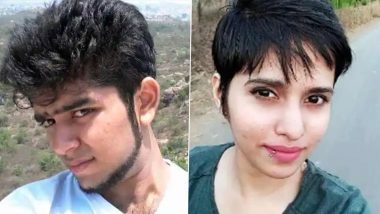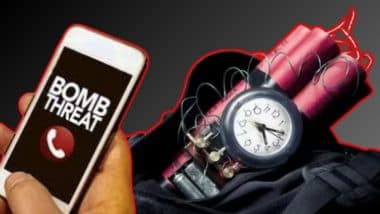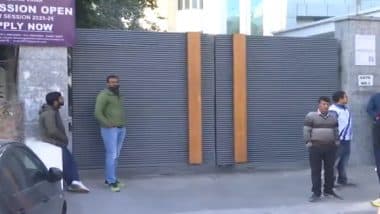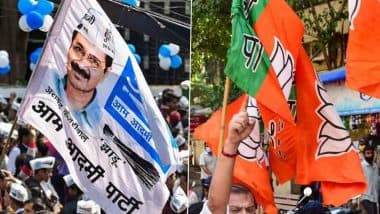New Delhi, December 1: The reported "confessions", including those allegedly made before a magistrate, by Mehrauli killing accused Aaftab Amin Poonawala do not have conclusive legal validity, experts said, doubting that several key conditions were not fulfilled.
Though police and other official sources have claimed that Poonawala had confessed to killing his live-in partner Shraddha Walkar and dismembering her body, his counsel has said Poonawala had denied that he had confessed. Shraddha Walkar Murder Case: Aaftab Amin Poonawalla Confesses to Killing Live-In Partner and Disposing Off Her Body Parts During Polygraph Test.
The legal experts also questioned Poonawala's confession before a magistrate through video conferencing and termed it objectionable and unprecedented. News reports quoting sources in the Delhi Police have claimed on multiple occasions that Poonawala had confessed to killing Walkar, cutting her body into 35 pieces and dumping them in different areas of the city.
On Wednesday, it was reported that he has confessed to his crime in a polygraph test conducted at the Forensic Science Laboratory (FSL) in Rohini, to which retired Delhi High Court judge Justice RS Sondhi said narcoanalysis and polygraph test are "useless and a waste of time as they have no legal sanctity". "What he did after killing the girl is merely destruction of evidence," he said. Shraddha Walkar Murder Case: Weapons Used by Aaftab Amin Poonawalla To Chop Up Victim’s Body Recovered, Say Sources.
Earlier, on November 22, Delhi Police sources had claimed that during the hearing of extension of Poonawala's remand application, he told the magistrate through video conferencing that he killed Walkar in the heat of the moment and it was not deliberate.
Soon after that, Poonawala's lawyer Abinash Kumar contradicted the police version and said he never made any such confession before the magistrate.
On his confession through video conferencing, Justice Sondhi said, "This is an objectionable method of appearance. You do not know under what pressure he was in. He should have been physically present before the magistrate."
The Delhi Police has claimed that he appeared through video conferencing as there was a safety issue. On November 28, a police van carrying Poonawala was attacked by some weapon-wielding people outside the FSL where he was taken for polygraph test.
Justice Sondhi is of the view that such reported confessions are meaningless and the Delhi Police is "wasting its time and enjoying the publicity by leaking such information to the media". Experts said according to the law, confessions before a magistrate is an admissible evidence and it benefits police in solving a crime, but those through video conferencing and reported in media does not build any case in favour of the investigating agency as they have no legal validity.
"His confession has no legal value because at that time he was in police custody. For a legally valid confession, a magistrate should ensure that an accused does it with a free will. The accused should be given time to think and reflect on what he wants to say," Justice Sondhi said.
The important thing is the evidence of circumstances that show he killed her. "The circumstances are such that the chain is complete and police do not leave loose links," he said.
Noted criminal lawyer and former additional solicitor general Sidharth Luthra said confessions in police custody can become admissible only when a magistrate complies with section 164 of the Code of Criminal Procedure that says the magistrate is duty bound to ensure confession is voluntary.
Citing a Supreme Court judgment in the Shivappa vs State of Karnataka (1995) case, Luthra said, "Magistrate is required to put questions to the accused as to the manner he has been treated in police custody and also directly ask the accused why he is making a statement that goes against his self-interest."
"It is only when the aforesaid procedure is followed that a confession made by an accused before a magistrate during hearing of a remand application becomes admissible in court," he added.
Criminal lawyer R V Kini, who had represented the prosecution in the case of film producer Neeraj Grover who was murdered and chopped into pieces in 2008, stressed on physical appearance before a magistrate and not video conferencing.
"There are several safeguards in the law so that the accused is aware of the consequences of his confession. There are provisions to ensure that he should get time to think over for a day to make a confession," Kini said.
Criminal lawyer Nishant Srivastava, founder and managing partner of Actus Legal, said it is unprecedented that an accused has made a confession through video conferencing.
"Since the confession was made through video conferencing, tomorrow if the accused alleges that he made the confession because on the other side of the camera, the police had pointed a gun at him, what will the police do," Srivastava said.
(This is an unedited and auto-generated story from Syndicated News feed, LatestLY Staff may not have modified or edited the content body)













 Quickly
Quickly





















